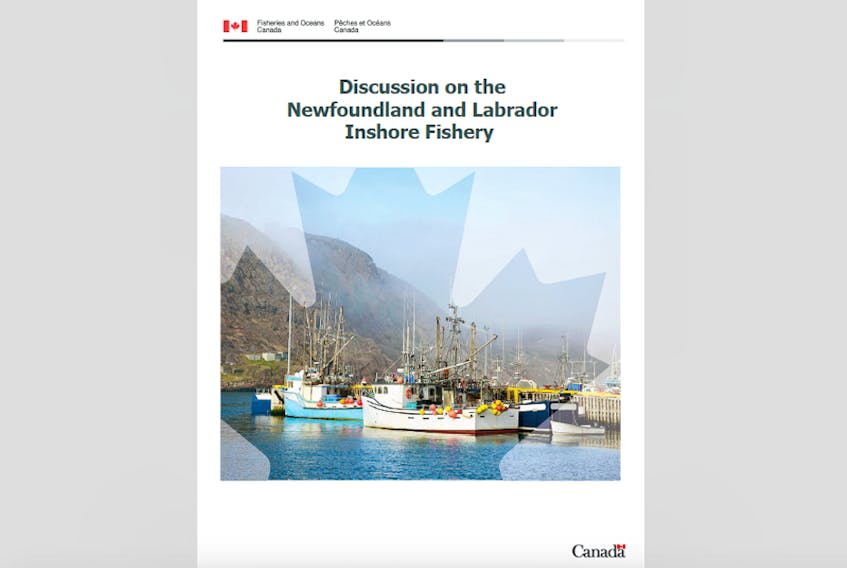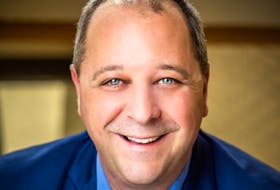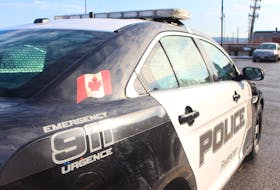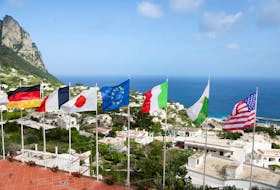MARYSTOWN, N.L. — The Department of Fisheries and Oceans (DFO) is back on the road listening to inshore fish harvesters in the province.
Alfred Fitzpatrick, a Garnish-based fisherman who represents Burin Peninsula harvesters on the Fish, Food and Allied Workers union’s (FFAW-Unifor) inshore council, is of two minds about attending the meeting in Fortune next week, however.
“It’s nice for them to get out around and meet with the people, meet with the fish harvesters, but I mean if they’re not open to changing any of the rules that fish harvesters got problems with, well what’s the point of having meetings?” Fitzpatrick said.
On the other hand, if no one shows up, they can’t say DFO hasn’t tried to listen.
“Hopefully, something will come out of it all,” Fitzpatrick says, though harvesters feel they are just being appeased.
“They’re just listening to you for the sake of listening to you, thinks they’re doing you a favour, but if there’s not going to be no change and no end result, why even bother? That’s the way I looks at it.”
New report
According to DFO, the main goal for the meetings is to discuss the newly released “What We Heard: A Discussion on the Newfoundland and Labrador Fishery” document.
DFO held 21 inshore outreach meetings around the province in late 2017 and early 2018, regarded by those in the industry as the first time the department had done so in such a face-to-face fashion in many years.
The document, which took almost a year to release, outlines the concerns raised by harvesters during those sessions, broken down by species, with DFO supplying responses to individual issues.
The relationship between inshore harvesters and DFO has often been contentious. The document acknowledged harvesters want more opportunities to speak directly to representatives from DFO.
“DFO recognizes that it is essential to have continuous dialogue with harvesters who have first-hand knowledge, expertise and experience,” the executive summary states.
“While the current management cycle includes numerous opportunities for formal consultation as well as informal discussion, DFO is committed to continuing to conduct these outreach meetings in 2019.”
This week, meetings were scheduled in NAFO Division 3L including sessions in Bonavista, Clarenville, Hant’s Harbour, Bauline and Trepassey. Attendance was sparse for the first two – in Bonavista and Clarenville – according to reports.
A trio of meetings are being held for fishers in 3Ps next week – at the Civic Centre in Southern Harbour on Tuesday, Feb. 12 from 6:30-9:30 p.m.; at the Lions Club in Fortune on Wednesday afternoon, Feb. 13 from 3-5 p.m.; and at the Southern Port Hotel in Harbour Breton on Friday, Feb. 15 from 10 a.m.-12 p.m.
3Ps is located along the province's south coast and takes in both Fortune and Placentia bays.
A schedule of meetings for 3K and 4R3Pn has been released and DFO says additional meeting are being planned for 2J.
‘Waste of money’
According to a post on the Federation of Independent Sea Harvesters of Newfoundland and Labrador’s Facebook page, the group obtained the draft reports completed by DFO area directors Ron Burton and John Lubar through the federal Access to Information Act some time ago.
“The reports by Burton and Lubar were much more colourful and detailed than DFO's final, sanitized report,” the post stated.
Fitzpatrick said he scanned the document and didn’t see anything “earth shattering” in its 39 pages.
“If they’re not coming here with open minds, and if all they’re going to do is listen to the same stuff they listened to last year and in a year’s time they’re going to spit out the same report … I calls it a colossal waste of money,” he said.
Fitzpatrick also said, while he understands they were trying to set up meetings in different places this time, holding the session in Marystown again on the Burin Peninsula, because it’s a central location, instead of Fortune, would have been better.
“People from Petite Forte and Baine Harbour, they’re not going driving to Fortune for a meeting just to listen to DFO. If it had to have been in Marystown, you could have got a few people from everywhere,” he said.
The Southern Gazette reached out to DFO to discuss the “What We Heard” document and the inshore outreach meetings but an interview could not be arranged before deadline.
The full “What We Heard” document can be viewed online at http://dfo-mpo.gc.ca/fm-gp/peches-fisheries/comm/consultation/inshore-nf-cotiere-tnl-eng.htm.
Concerns in 3Ps
The “What we Heard” document highlights numerous concerns raised by fishers in 3Ps during the Department of Fisheries and Oceans (DFO) outreach meetings in 2017-18. Here are three of them along with DFO’s responses:
- Harvesters were unhappy that the 3Ps cod fishery was opened to the mobile gear fleet in November 2017 and requested those vessels be excluded until the total allowable catch (TAC) is above 10,000 tonnes. Some harvesters said the cod fishery in 3Ps should be closed altogether by mid or late January.
According to DFO, however, the mobile gear fleet has been traditionally allocated cod quota in 3Ps and is an active participant in the fishery. As well, DFO indicated the opening of the fishery the mobile gear fleet in 2017 was not new access and acknowledged there is no minimum quota threshold that removes the mobile gear fleet from the 3Ps cod fishery.
- Inshore harvesters raised concerns about companies from Nova Scotia catching Atlantic halibut in 3Ps.
In its response, DFO indicated enterprises based in the neighbouring province have a history of fishing access and activity in 3Ps. The enterprises are licenced to fish in the area, but must follow all the conditions of those licences.
- Harvesters were critical of the way DFO handles access and allocation of the various scallop beds in 3Ps and that vessels from Nova Scotia are allowed to harvest the species in the area.
DFO pointed out the allocations for the sea scallop beds in 3Ps were put in place in 2006 based on recommendations in the Hooley report. Newfoundland and Labrador’s inshore fleet receives 100 per cent of the North Bed quota. The offshore scallop fleet – which DFO said has a history of fishing in 3Ps – is allocated 100 per cent of the Middle and South beds.









